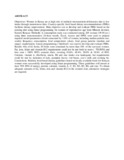Development of Food Based Dietary Guidelines for Kenyan Women Using Linear Programming

View/
Date
2015-08-14Author
Ngala, SA
Akter, SM
Mwangi, AM
Brouwer, I D
Language
enMetadata
Show full item recordAbstract
Objectives: Women in Kenya are at high risk of multiple micronutrient deficiencies due to low
intake through monotonous diets. Country-specific food based dietary recommendations (FBRs)
facilitate dietary improvement. Main objective was to develop and evaluate FBRs based on the
existing diet using linear programming for women of reproductive age from Mbooni division,
Eastern Kenyan.
Methods: A consumption study was conducted among 205 woman (19-50 yrs.) using three nonconsecutive
24-hour recalls. Excel, Access and SPSS were used to prepare required model
parameters (foods consumed by >10% of women, including median portion size, weekly frequency
consumption, food composition values, food group patterns (median and range), staple/snacks.
Linear programming (‘Optifood') was used to develop and evaluate FBRs.
Results: Out of 62 foods, 30 foods were consumed by more than 10% of the surveyed women.
Fat, iron, folate and vitamin-B12 requirements could not be met both in worst (≥70%RNI) and best
case (≥100% RNI) scenario diets, covering 43.6%, 48.4%, 30.0% & 18.8% of RNI. Calcium,
vitamin A, riboflavin, niacin, B6 and zinc intake was inadequate, but requirements could be met by
inclusion of kale, pumpkin leaves, red beans, cow's milk and cooking fat.
Conclusions: Realistic food based dietary guidelines based on locally available foods for Kenyan
women were successfully developed using linear programming. These guidelines will ensure at
least 70% RNI of energy, protein, calcium, vitamin A, C, B1, B2, B5, B6, and zinc. To obtain
adequate amounts of fat, folate, iron and vitamin-B12 in the women's diet, alternative strategies are
required.
Citation
Ngala, SA ., Akter, SM., Mwangi, AM and Brouwer, ID (2015). Development of Food Based Dietary Guidelines for Kenyan Women Using Linear Programming .European Journal of Nutrition & Food Safety 5(5): 540,Publisher
University of Nairobi
